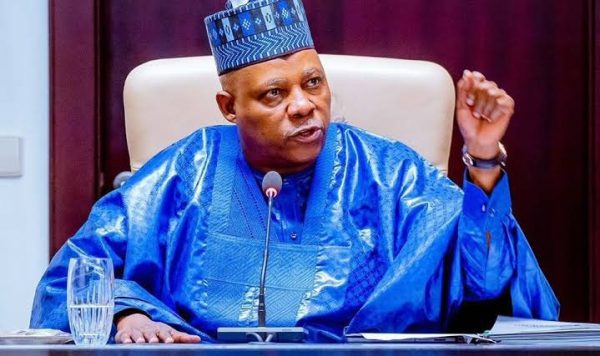Vice-President Kashim Shettima on Friday emphasised that President Bola Tinubu’s administration was prioritising health, education and human capital development.
Shettima stated this at the inauguration of the revamped National Economic Council (NEC) Human Capital Development (HCD) Steering Committee, held at the Presidential Villa, Abuja.
The vice president explained that the Federal Government reconstituted the committee to reflect the nation’s new leadership and bring all stakeholders together.
He said it was imperative to ensure access to quality schooling for every Nigerian child.
Shettima noted that education was a catalyst for unlocking opportunities and fostering a skilled workforce capable of thriving in the 21st-century economy.
”The HCD programme invites each of us to participate in ensuring that every child has access to quality schooling,” he affirmed.
He noted the determination of President Tinubu’s administration to bolster labour force participation, even as he issued a fervent call to action.
In his speech titled, “The Burden of Trust in Leadership Transition,” Shettima tasked the new committee to deliver tangible progress on the three core pillars of health, nutrition, education, and labour force participation.
He said each phase of their obligation to serve the nation reminded them of the impacts of their choices, pointing out that the current day was no exception.
”This is the future we seek, a future where every Nigerian has the opportunity to fulfil their dreams and contribute to the prosperity of our nation.
”I believe that this alignment of interests signals the approval of what HCD set out to accomplish—the addition of 24 million healthy, educated, and productive Nigerians to our expanding population by 2030.”
He declared that every Nigerian must thrive under the new administration’s visionary agenda.
“Our human capital remains our greatest asset, and investing in its development is not only a moral responsibility but also an economic necessity.”
He aligned the HCD programme’s objectives with President Tinubu’s eight-point agenda, including eradicating poverty and creating jobs.
According to him, “every Nigerian must thrive” for the country to realise its true potential.
”We are going to rely on defined frameworks and data to pursue investment in healthcare systems that are resilient, accessible, and responsive to the needs of our citizens.
“We are committed to prioritising preventive care, reducing child mortality, stunting, tackling malnutrition and improving maternal health.”
The Speaker of the House of Representatives, Abbas Tajudeen, lauded the move, saying, “It is extremely gratifying that the Vice-President has deemed it fit to inaugurate this very important group.
”For many years, a lot of Nigerians have been yearning for the resuscitation of this group, having seen the modest contribution it made in the previous administration.”
Tajudeen affirmed the National Assembly’s commitment to legislative collaboration.
He said ” Our take in the House of Representatives and, by extension, the National Assembly is to say we would be worthy collaborators legislatively.
“Coincidentally, most of the sectors captured under this particular group are also embedded in our legislative agenda and the President’s Renewed Hope Agenda.”
Also, Kwara state governor, AbdulRahman AbdulRazaq said their presence at the event signified the governors’ commitment to human capital development.
AbdulRazaq, who is also the Chairman of the Nigeria Governors’ Forum (NGF), emphasised the need for upward integration of various HCD programmes, especially in education, healthcare, and social protection.
”The ultimate aim is to improve the lives of our citizens. We are ready to trickle down and right to the local government all the programmes that are necessary to uplift our citizens.”
The Coordinating Minister of Health and Social Welfare, Prof. Muhammad Pate, underscored the strategic importance of the initiative.
”If you don’t know where you are going, any road will take you there. We know where we are today, and we know where we should be.
”There is very good evidence that investments in education, health, women, and girls are the right investments,” he maintained.
Pate emphasised the need for a whole-of-government and whole-of-society approach to governance, where every individual’s productivity was optimised.
He called upon state governors to develop subnational HCD indices to measure progress.
NAN


